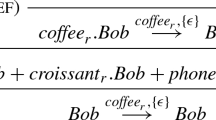Abstract
This paper describes a toolkit that assists in the task of generating abstract approximations of process algebraic specifications written in the language μCRL. Abstractions are represented by Modal Labelled Transition Systems, which are mixed transition systems with may and must modalities. The approach permits to infer the satisfaction or refutation of safety and liveness properties expressed in the (action-based) μ-calculus. The tool supports the abstraction of states and action labels, which allows to deal with infinitely branching systems.
Similar content being viewed by others
References
Ball T, Majumdar R, Millstein T, Rajamani SK (2001) Automatic predicate abstraction of C programs. In: Proceedings of Conference on Programming Language Design and Implementation (PLDI), ACM, pp 203–213
Ball T, Rajamani SK (2000) BeBop: a symbolic model checker for Boolean programs. In: Proceedings of SPIN model checking and software verification, LNCS, vol 1885, Springer, pp 113–130
Ball T, Rajamani SK (2001) Automatically validating temporal safety properties of interfaces. In: Proceedings of SPIN model checking and software verification, LNCS, vol 2057. Springer, pp 103–122
Bergstra JA, Klop JW (1985) Algebra of communicating processes with abstraction. Theor Comput Sci 37:77–121
Blom S, Fokkink W, Groote JF, van Langevelde I, Lisser B, van de Pol JC (2001) μCRL: a toolset for analysing algebraic specifications. In: Proceedings of Computer Aided Verification (CAV), LNCS, vol 2102. Springer, pp 250–254
Blom S, Groote JF, van Langevelde I, Lisser B, van de Pol JC (2003) New developments around the μCRL tool set. ENTCS 80
Bruns G, Godefroid P (1999) Model checking partial state spaces with 3-valued temporal logics. In: Proceedings of Computer Aided Verification (CAV), LNCS, vol 1877. Springer, pp 274–287
Clarke EM, Grumberg O, Long DE (1992) Model checking and abstraction. J ACM, pp 343–354
Cousot P, Cousot R (1977) Abstract interpretation: a unified lattice model for static analysis of programs by construction of approximation of fixed points. J ACM 238–252
Dams D (1996) Abstract interpretation and partition refinement for model checking. PhD thesis, Eindhoven University of Technology
Dams D (2002) Abstraction in software model checking: principles and practice (tutorial overview and bibliography). In: Proceedings of SPIN model checking and software verification, LNCS, vol 2318, Springer, pp 14–21
Dams D, Gerth R (2000) The bounded retransmission protocol revisited. ENTCS 9
Dams D, Hesse W, Holzmann G (2002) Abstracting C with abC. In: Proceedings of the Computer Aided Verification (CAV), LNCS, vol 2404, Springer, pp 515–520
Long DE (1993) Model checking, abstraction, and compositional verification. PhD thesis, Carnegie Mellon University
Gallardo MM, Martínez J, Merino P, Pimentel E (2004) αSPIN: a tool for abstract model checking. Int J Softw Tools for Technol Transf (STTT) 5(2–3):165–184
Garavel H, Lang F, Mateescu R (2002) An overview of CADP 2001. Eur Assoc Softw Sci Technol Newsl 4:13–24
Godefroid P, Huth M, Jagadeesan R (2001) Abstraction-based model checking using modal transition systems. In: Proceedings of the concurrency theory (CONCUR), LNCS, vol 2154, Springer, pp 426–440
Groote JF, van de Pol JC (1996) A bounded retransmission protocol for large data packets. In: Proceedings of the Algebraic Methodology and Software Technology (AMAST), LNCS, vol 1101. Springer, pp 536–550
Groote JF, Ponse A (1994) The syntax and semantics of μCRL. In: Algebra of communicating processes, workshops in computing. pp 26–62
Groote JF, Ponse A, Usenko Y (2001) Linearization in parallel pCRL. J Logic Algebraic Programm 48(1–2):39–70
Hatcliff J, Dwyer M, Pasareanu C, Robby (2002) Foundations of the Bandera abstraction tools. In: Proceedings of the essence of computation, LNCS, vol 2566, Springer, pp 172–203
Havelund K, Skakkebaek J (1999) Applying model checking in Java verification. In: Proceedings of the SPIN model checking and software verification, LNCS, vol 1680, Springer, pp 216–232
Holzmann GJ, Smith MH (1999) A practical method for verifying event-driven software. In: Proceedings of International Conference on Software Engineering (ICSE). ACM, pp 597–607
Huth M, Jagadeesan R, Schmidt D (2001) Modal transition systems: a foundation for three-valued program analysis. In: Proceedings of the programming languages and systems (ESOP), LNCS, vol 2028, Springer, pp 155–169
Jones ND, Nielson F (1995) Abstract interpretation: a semantics-based tool for program analysis. In: Handbook of logic in computer science. Oxford Science Publications, pp 527–636
Kozen D (1982) Results on the propositional μ-calculus. In: Proceedings of the International Conference on Automata, Languages and Programming (ICALP), LNCS, vol 140. Springer, pp 348–359
Kroening D, Groce A, Clarke EM (2004) Counterexample guided abstraction refinement via program execution. In: Proceedings of the international conference on formal engineering methods (ICFEM), LNCS, vol 3380. Springer, pp 224–238
Larsen KG, Thomsen B (1988) A modal process logic. In: Proceedings of the logic in computer science (LICS). IEEE, pp 203–210
Manna Z, Colon M, Finkbeiner B, Sipma H, Uribe TE (1997) Abstraction and modular verification of infinite-state reactive systems. In: Proceedings of the requirements targeting software and systems engineering (RTSE), LNCS, vol 1526. Springer, pp 273–292
Mateescu R (1998) Verification des proprietes temporelles des programmes paralleles. PhD thesis, Institut National Polytechnique de Grenoble
Ore O (1944) Galois connexions. Trans. Am Math Soc 55:493–513
Orzan S, van de Pol JC, Valero Espada M (2005) A state space distribution policy based on abstract interpretation. ENTCS 128:35–45
van de Pol JC (2001) A prover for the μCRL toolset with applications. Technical Report SEN-R0106, CWI
van de Pol JC, Valero Espada M (2004) Modal abstraction in μCRL. In: Proceedings of the Algebraic Methodology and Software Technology (AMAST), LNCS, vol 3116, Springer, pp 409–425
Schmidt D (2002) Structure-preserving binary relations for program abstraction. In: Proceedings of the essence of computation, LNCS, vol 2566, Springer, pp 245–268
Usenko Y (2002) Linearization in μCRL. PhD thesis, Eindhoven University of Technology
Valero M (2005) Modal abstraction and replication of processes with data. PhD thesis, Free University Amsterdam
Willemse T (2003) Semantics and verification in process algebras with data and timing. PhD thesis, Eindhoven University of Technology
Author information
Authors and Affiliations
Corresponding author
Rights and permissions
About this article
Cite this article
Espada, M.V., Pol, J.v.d. An abstract interpretation toolkit for μCRL. Form Method Syst Des 30, 249–273 (2007). https://doi.org/10.1007/s10703-006-0029-7
Published:
Issue Date:
DOI: https://doi.org/10.1007/s10703-006-0029-7





